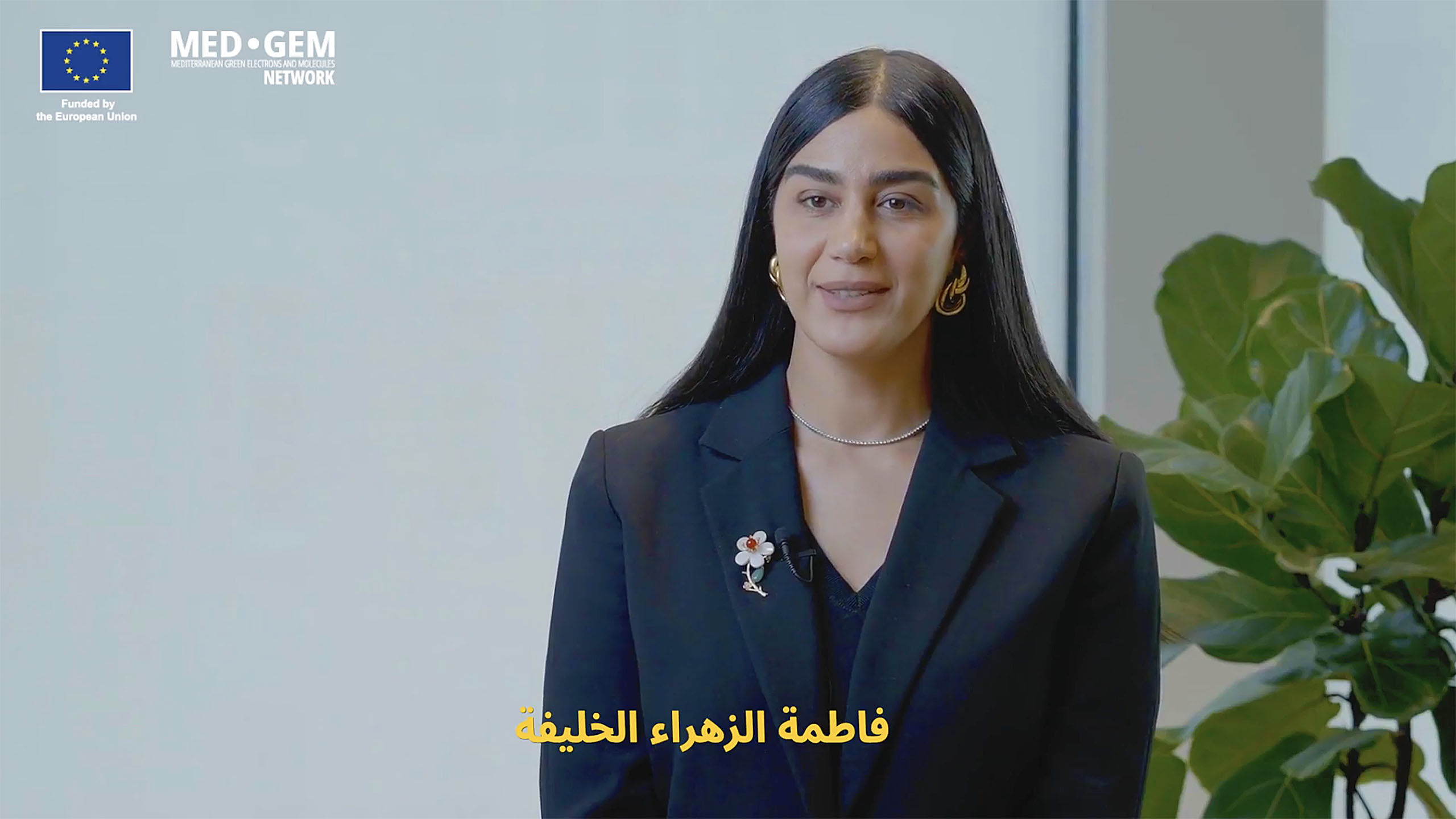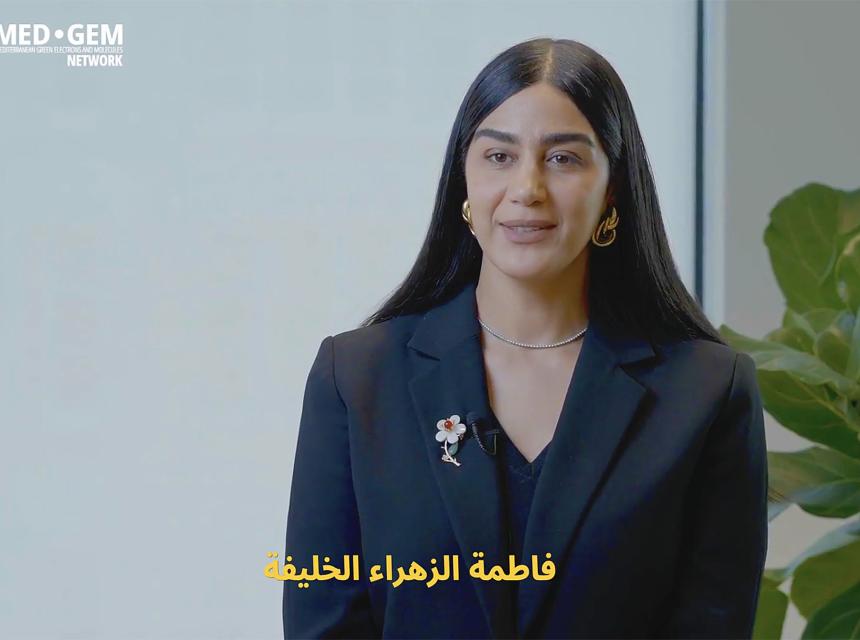Cluster EnR Morocco: Accelerate the green transition through innovation and collaboration. | Interview with Mrs. Fatima Zahra El Khalifa
In a global context where the energy transition has become imperative, Morocco is asserting itself as a regional leader in renewable energy. Ms. Fatima Zahra El Khalifa, General Director of the Cluster EnR, leads this mission with determination. During the third MED-GEM Network steering committee held on June 11th 2024 at Hydrogen Europe’s headquarters in Brussels, she shared her strategic vision to accelerate this transition, emphasising the importance of infrastructure and regional partnerships.

Moroccan Leadership in Energy Transition
Morocco stands out for its firm commitment to energy transition. The Cluster EnR, a non-profit organization, plays a crucial role in this dynamic. With over 300 members from the private, public, financial, academic sectors, and R&D institutions, the Cluster EnR is a key accelerator of the energy transition. “Our primary goal is to contribute to the acceleration of the green transition in Morocco through capacity building, networking, and optimising the local content of green projects,” stated Fatima Zahra El Khalifa during her address at the MED-GEM Steering Committee.
The Cluster EnR indeed provides high-value services to meet the needs of various stakeholders in the ecosystem. By facilitating collaboration among businesses, institutions, and researchers, it contributes to creating a competitive industrial sector in renewable energy. “We have established a dynamic ecosystem that fosters innovation and technology transfer, thereby creating a robust industrial sector capable of meeting the challenges of the energy transition,” added Mrs. El Khalifa.
Ambitious Goals for a Sustainable Future
Morocco’s renewable energy ambitions are clear and significant. By 2030, the country aims to produce 52% of its energy from renewable sources. "At the same time, we are committed to reducing our carbon emissions by 45% by 2025," she noted. These efforts are part of a broader strategy, with the creation of green jobs also being a priority. "We estimate that more than 100,000 green jobs could be created by 2030, which is crucial for the Moroccan economy."
Strengthening Infrastructure: A Challenge for Green Hydrogen
One of the main challenges discussed by Mrs. Fatima Zahra El Khalifa concerns the infrastructure needed to support this transition, particularly in the green hydrogen sector. "The infrastructure study we conducted shows that while the Arab region has significant infrastructure, it is imperative to expand and strengthen it to maximise the potential for hydrogen exports to Europe," she stressed. Initiated by one of the three working groups of the Industrial Advisory Board (IAB) of MED-GEM, co-led by Mrs. Tiziana de Harlez, programme manager of the network, funded by the European Union, and implemented by GIZ Ins, the study revealed that the Mediterranean region needs more robust pipelines and better interconnection to ensure optimal exchange of green molecules.
Decarbonisation: An Urgent Priority for Moroccan Industry
The integration of new European regulations, such as the Carbon Border Adjustment Mechanism (CBAM), is another priority for Morocco. "It is essential that our industry prepares for decarbonisation to remain competitive in the European market," stated Ms. El Khalifa. Discussions within the MED-GEM network have highlighted the importance of these regulations and the imminent deadlines, with CBAM set to be implemented in 2026. "This deadline is already upon us, and it is crucial that we are prepared," she added, stressing the urgency of developing a national action plan to support this transition.
Towards Enhanced Mediterranean Cooperation
Mrs. Fatima Zahra El Khalifa also underscored the importance of regional cooperation for achieving this energy transition. "What I expect from our next meeting is to see concrete actions implemented by each country so that we can truly move forward together towards our 2030 goals," she declared. She proposed that the next step would not only be a presentation of study results but a follow-up on concrete actions taken by each country to strengthen regional synergy.
A Moroccan Strategy in Three Steps for 2030
In her interview, Mrs. El Khalifa detailed a Moroccan strategy in three steps to achieve the 2030 goals: first, strengthening national capacities through training programs and partnerships, notably with the Office de la Formation Professionnelle et de la Promotion du Travail (OFPPT), the Agence nationale de promotion de l'emploi et des compétences (ANAPEC), the Institut de Formation aux Métiers des Energies Renouvelables et de l'Efficacité Energétique (IFMEREE), and the Moroccan Agency for Sustainable Energy (MASEN); second, improving infrastructure to support green hydrogen exports; and finally, adapting the national industry to new international regulations, such as CBAM.
Conclusion: An Energy Future Under Construction
As Mrs. Fatima Zahra El Khalifa points out, Morocco is moving resolutely towards an energy transition that combines ambition, innovation, and regional cooperation. "The path to 2030 is fraught with challenges, but with a clear vision and solid partnerships, we can achieve our goals," she concludes. The next MED-GEM network meeting will be crucial for turning this vision into tangible reality and ensuring that Morocco, alongside its Mediterranean partners, plays a central role in the global energy future.

